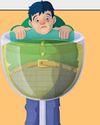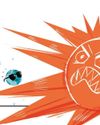
The first quarter of this year has heralded outbreaks of measles in the US and the UK; a global shortage of the cholera vaccine; and even a case of bubonic plague for the unlucky owner of an infected cat in Oregon. Infectious diseases we thought were long gone are resurfacing, thanks in part to global conflict, international travel and climate change. But how much disease re-emergence is normal?
To find out, we spoke to Paul Hunter, Professor in Medicine at University of East Anglia's Norwich Medical School.
HOW NORMAL IS IT FOR DISEASES THAT WE THINK ARE GONE TO COME BACK?
The issue is whether they've actually gone or not. A lot of infections that were common once and still spread within society can come back with force in the future. Globally, we typically see one or two significant emergences or re-emergences every year, on average.
For many of the classic infectious diseases that seem to re-emerge, they've probably been around pretty much the whole time. Re-emergence is usually more on a regional level, such as when cholera spreads into an area that it's not caused problems in for decades.
IS IT POSSIBLE TO FULLY WIPE A DISEASE FROM THE FACE OF THE PLANET?
We did it with smallpox. We thought we might do it with poliomyelitis too, although it's not looking good. So generally, no, we don't expect to eradicate most infections. Once the infection spreads, globally and through society, you can manage and control it, but they're almost impossible to eradicate.
With smallpox, the vaccine was highly effective. There was also a lot of will to get rid of the disease and we could diagnose it fairly easily so you could quickly tell whether it had spread. Nowadays, there are a few problems. Many infections are infectious before somebody gets sick.
This story is from the March 2024 edition of BBC Science Focus.
Start your 7-day Magzter GOLD free trial to access thousands of curated premium stories, and 9,000+ magazines and newspapers.
Already a subscriber ? Sign In
This story is from the March 2024 edition of BBC Science Focus.
Start your 7-day Magzter GOLD free trial to access thousands of curated premium stories, and 9,000+ magazines and newspapers.
Already a subscriber? Sign In

NOW YOU SEE ME, NOW YOU DON'T
Scientists around the world are working on ways to hide us from sight. But how close are we to developing tech that could make us invisible?

UNCORKED POTENTIAL
How much good can ditching drink for a month really do? Answer: a whole lot. In fact, science shows even short-term abstinence could unlock a cocktail of lasting benefits

Scientists discover when humans and dogs became friends
The relationship spans thousands of years, but experts might have pinpointed the first connection

Why it's so hard to kick a gambling addiction
We now know that gambling can be as addictive as drugs, but there are factors that can make it even harder to quit

How much could Ozempic change our world?
The weight-loss drug has made headlines and broken sales records, but what does it mean for our future?

WHY DOES DRINKING ALCOHOL MAKE IT SO MUCH HARDER TO LOSE WEIGHT?
While enjoying the occasional glass of wine or pint of beer may seem harmless, regular or excessive alcohol consumption can significantly hinder your weight-loss journey for a few reasons:

Why do so many New Year's resolutions fail?
Establishing positive new habits is hard at any time of year. But there are ways to stop your attempts ending in failure

'Extreme' solar radiation storm could hit Earth
Sun-like stars may have tantrums far more frequently than we thought

HOW CAN I BANISH THE JANUARY BLUES?
Dark mornings, long chilly evenings and short days; many people find January tough.

Neutrinos are getting in the way of dark matter detection
These troublesome particles are difficult to detect, but they're starting to show up in places where they're not wanted